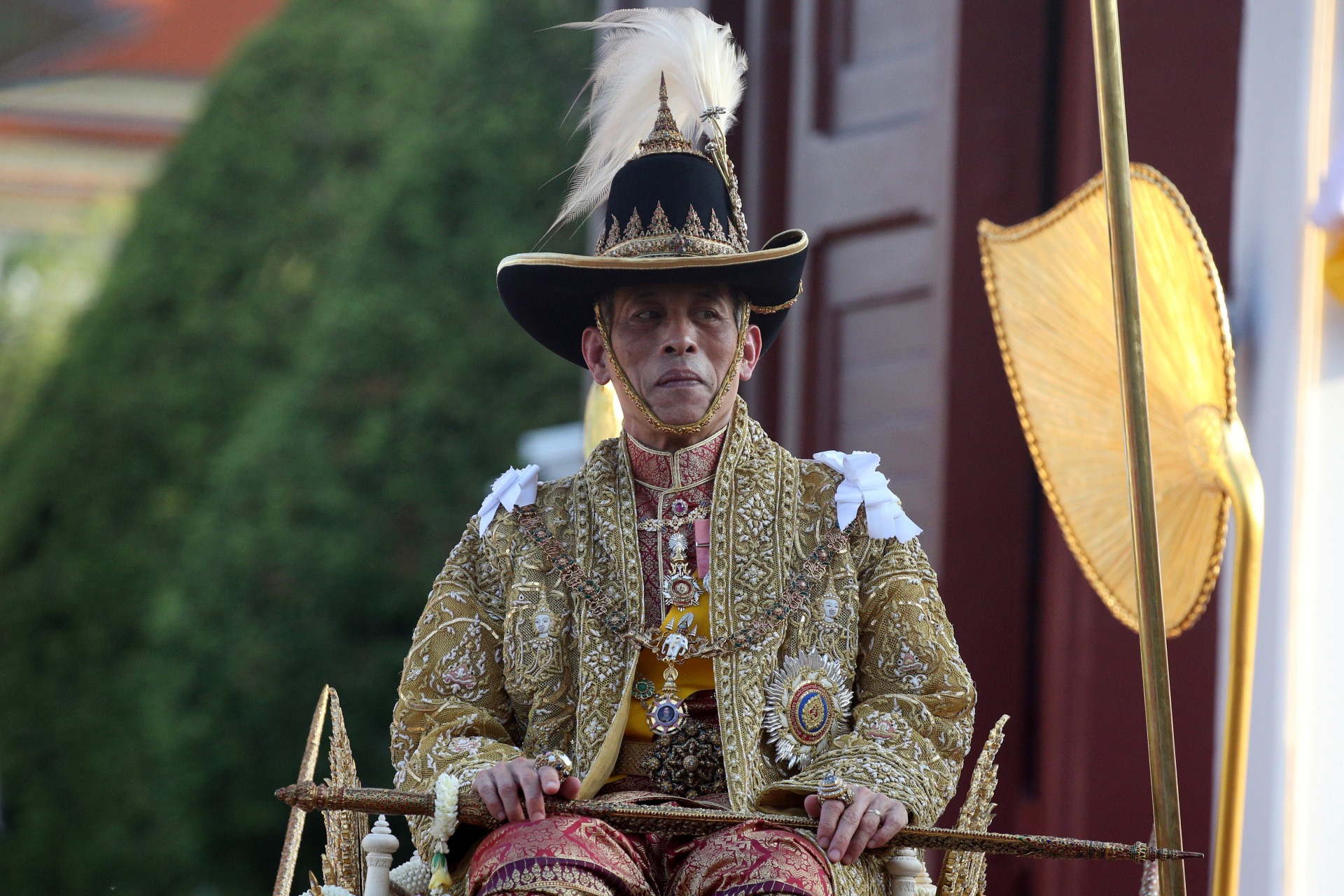The Impact of the Coronation of King Vajiralongkorn

By experts and staff
- Published
Experts
![]() By Joshua KurlantzickSenior Fellow for Southeast Asia and South Asia
By Joshua KurlantzickSenior Fellow for Southeast Asia and South Asia
By
- Guest Blogger for Asia Unbound
By Pavin Chachavalpongpun and Joshua Kurlantzick
The coronation of King Vajiralongkorn of Thailand, held last weekend, was the first crowning of a Thai sovereign since that of his father, the late King Bhumibol Adulyadej, who was enthroned in May 1950. A few days before the coronation, King Vajiralongkorn surprised the public by announcing his marriage, the king’s fourth, with Suthida Vajiralongkorn na Ayutthaya, a former flight attendant who is now Thailand’s queen consort.
The crowning of Vajiralongkorn last weekend was a formal ceremony; in reality, he has already been acting as king for two and a half years. Bhumibol reigned for seventy years until he passed away in October 2016, and generally amassed enormous goodwill among Thais, as well as substantial moral capital that he could use at times of great crisis in the kingdom. The long, authoritative reign of Bhumibol started when he was quite young, and Thais’ images of him were mostly a blank slate, allowing the king and his allies in the military and the Cold War-era United States, for whom Thailand was a critical partner, to shape a benign, caring image of Bhumibol to the Thai public.
However, the relatively advanced age that his son ascends to the throne (he is sixty-six, while his father was enthroned at age twenty-two, and some Thai citizens’ concerns about the new king’s suitability for the throne and how he plans to utilize his powers, raise critical questions about whether Vajiralongkorn could ever enjoy the popularity of his father. It will be much harder for the new king to win the public trust, and repeat his father’s success as a respected mediator. Yet Thailand’s prospects in the post-coronation period rest, in good part, on the ability of King Vajiralongkorn to build a new consensus with the country’s major political stakeholders—some of whom are the same as they have been for decades, while others are emerging onto the scene.
To be sure, Thailand is technically a constitutional monarchy, with the monarch supposedly above politics, but since the end of Thailand’s absolute monarchy in the 1930s the monarch has long competed with, and allied himself with, politicians in wielding of political power. During the Bhumibol period, the king built a political network, known in Thailand scholar Duncan McCargo’s phrase, as the “network monarchy,” as a vehicle to wield power. Today, Vajiralongkorn is more open in his political ambition, and in how he involves himself in politics.
Thailand has fallen into a protracted crisis over the past twenty years, starting from the early period of Thaksin Shinawatra’s government, when he governed as an illiberal democrat—and getting worse in 2006, the year the Thaksin government was overthrown in a coup. The growing crisis at that time coincided with the decline of the Bhumibol era; as any Thai political consensus that existed unraveled, Bhumibol stood aside and then became increasingly physically incapacitated and unable to play a role as a mediator, as he had done at some points in the past in Thai history.
Thai political stability had been sustained in many of the previous decades in part because Bhumibol was able to negotiate a consensus among various political actors, such as the military and various pro-democracy movements. (However, Bhumibol certainly had conservative leanings, and sometimes abandoned his mediating role to more clearly back the military and its allies, thereby defying the idea that the monarchy remains above politics; but, the former king rarely openly delved into politics.) The former king was able to serve as this mediator because of his wide public popularity. It was also possible because he earned a great degree of legitimacy through his moral authority, which was partly created by a sophisticated public relations campaign overseen by the palace, but also depended on the former king traveling throughout Thailand and seeming to really care about the lives of most Thais.
But King Vajiralongkorn does not come to the throne with those advantages. The achievements of Bhumibol were individualistic and not institutional, meaning the royal transition fails to automatically bring security to the monarchy, although Bhumibol’s legacy, and the palace’s intense publicity campaigns, do offer some initial goodwill for the new king. Still, Vajiralongkorn faces several challenges in becoming a respected figure who could foster stability. For one, he has shown an intention to intervene more directly in politics than his father, such as by initially refusing to approve Thailand’s new constitution, until parts of the constitution were changed, and by taking more direct control of the wealthy Crown Property Bureau.
Second, the early days of his era as king have not led to a reduction in political tensions. The elections held on March 24, the first in Thailand since the coup of May 2014, were held in an unfair pre-election environment. Even so, a coalition of anti-junta parties initially appeared to have won a slim majority of seats in the lower house of Parliament, as well as the largest combined share of the popular vote. But the official results for all seats appear to have been interpreted, by Thailand’s election commission, in a questionable way that favors a coalition of pro-military parties, further deepening political uncertainties. The military is further using various avenues to try to destroy the anti-junta coalition of parties, and possibly put one of its key leaders in jail.
The king has been, at best, mute on these developments. Vajiralongkorn does not seem interested in brokering any consensus between the military and anti-junta parties. The country seems headed for continued instability, with a military-backed prime minister and seething anger among supporters of anti-junta parties. The current army chief General Apirat Kongsompong, handpicked by Vajiralongkorn, has several times intervened in politics. He has openly threatened and tried to intimidate the leadership of a new anti-junta party, Future Forward, which did extremely well for a first-time party in the March elections.
On the contrary, the new king turned down his best opportunity to broker a potentially lasting consensus in Thailand before the election was held—when he scotched a plan to have his sister, Princess Ubolratana, run as a prime minister candidate at the head of Thai Raksa Chart. Had she been allowed to run, and won, she could have possibly created a political compromise in which the powerful military was defanged, and tensions between groups of Thais on different sides of the political, regional, and social spectrums cooled. (She also might have caused other problems, as a royal-turned-prime minister who could have stifled dissent because of her position.)
But as it turned out, when former Prime Minister Thaksin Shinawatra nominated the princess as prime ministerial candidate for the Thaksin-linked Thai Raksa Chart, Vajiralongkorn issued a royal command: he did not only prevent the princess from running but castigated Thaksin for politicizing the monarchy. Vajiralongkorn’s response was seen as a move to calm the yellow-shirt royalists who were enraged by a potential alliance between Thaksin and Ubolratana, but it did nothing to position the new king as an honest broker in Thai politics.
More recently, King Vajiralongkorn continued to penalize Thaksin by stripping the former prime minister of royal decorations. This move will further thwart any attempt in bringing about consensus in the new reign.
Combined with a seeming desire to intervene more openly in politics—in some ways harkening back to the era of the absolute monarchy—and a disinterest in brokering between political actors, the new king does not have a reservoir of public trust that might sustain him even if he made controversial decisions. The Thai public, despite strict lèse majesté laws, has for years found ways to access stories of the new king, published in the foreign press, about his eccentric lifestyle and playboy reputation.
Forging political consensus is key to a successful reign. Consensus may not lead to democracy in Thailand, but stability can be achieved through political compromises. Bhumibol’s rule was characterized by the predominance of consensus over coercion, even though he tended to side with the military at most key moments. In contrast, only a few years into the Vajiralongkorn reign, it is unclear whether the new king has an interest in fostering political consensus at all.
Pavin Chachavalpongpun is associate professor at Kyoto University’s Center for Southeast Asian Studies.
